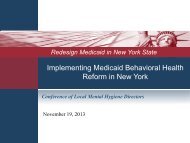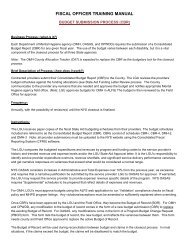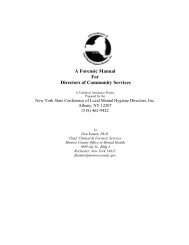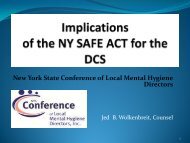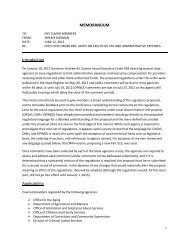fiscal officers training manual - New York State Conference of Local ...
fiscal officers training manual - New York State Conference of Local ...
fiscal officers training manual - New York State Conference of Local ...
Create successful ePaper yourself
Turn your PDF publications into a flip-book with our unique Google optimized e-Paper software.
Business Process: (what is it?)FISCAL OFFICER TRAINING MANUALCASE MANAGEMENT SERVICE DOLLARSThe Intensive Case Management (ICM), Supportive Case Management (SCM), Blended Case Management (BCM) andthe Adult Home program all have access to “service dollars.” The purpose <strong>of</strong> the service dollars is to provide funds forconsumers’ immediate and/or emergency needs and is intended to be used as the payment <strong>of</strong> last resort. The use <strong>of</strong> theservice dollars in the case management programs should include participation <strong>of</strong> the consumer, who should play asignificant role in the planning for, and the utilization <strong>of</strong>, service dollars.Brief Description <strong>of</strong> Process: (how does it work?)Service dollars must be spent on services consistent with a consumer’s service plan, designed to be flexible andresponsible to current individual needs. These services may include emergency services, both immediate and notimmediate. The emergency dollars aimed at meeting immediate basic needs <strong>of</strong> the consumer to include transportation,medical/dental care, shelter/respite/hotel, food/meals, clothing, escort and other. Service dollars may also includefurnishings, utilities, tuition, job related costs, job coaching, education, vocational services, leisure time services andothers.Two options to expend service dollars1. Client-Specific Services: Client-Specific Service needs are characterized as those needs which can beanticipated. Therefore, they must be reflected in the individual service plan <strong>of</strong> the client for payment to beapproved and need to be documented in the Client's progress notes.2. Emergency Purchases: Emergency Purchases are designed to address the immediate needs <strong>of</strong> a client. Theseneeds are generally brief in duration and are not anticipated. Emergency Purchases do not need to be inthe individualized service plan, but do need to be documented in the Client's progress notes.Service dollar expenditures may include the following:• Furnishings: Costs <strong>of</strong> any home furnishings such as furniture, linen, dishes, bedding, etc.• Homemaker/Housekeeping Services: Generally this is available either through the department <strong>of</strong> public health orprivate providers in the community. These services would be paid on an hourly basis and assist clients when theyare unable to meet their own homemaking or housekeeping needs.• Housing: Costs associated with securing and stabilizing an appropriate living situation such as apartment orroom. (security deposits)• Educational: Costs associated with educating a person. Costs may be computer school, secretarial school, automechanic, higher education, GED, etc. Related expenses may be included in this category such as books,supplies, etc.• Vocational /Employment: Costs associated with securing or maintaining a job. Costs such as uniform, job coach,transportation, etc.• Leisure Time Services: Costs used to purchase beneficial leisure time activities. These costs may contribute toimprovement <strong>of</strong> the person physically or emotionally, assisting in network building or distracting clients fromdetrimental activities. The need for these services must be clearly documented in the ISP.• Escort: Costs associated with having assistance available to the person on a continuous basis. This service maybe in the person's home, emergency housing situation, day program, etc.• Food/Meals: Costs <strong>of</strong> meals, groceries, or other necessary food items. Not to be used for any alcoholicbeverages or cigarettes



